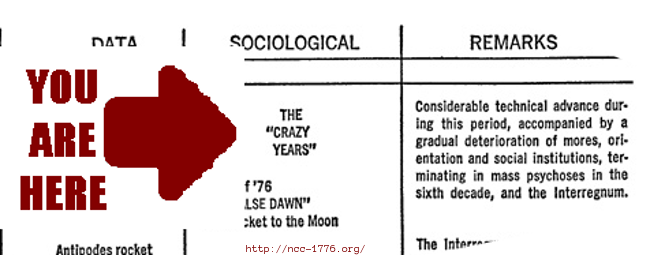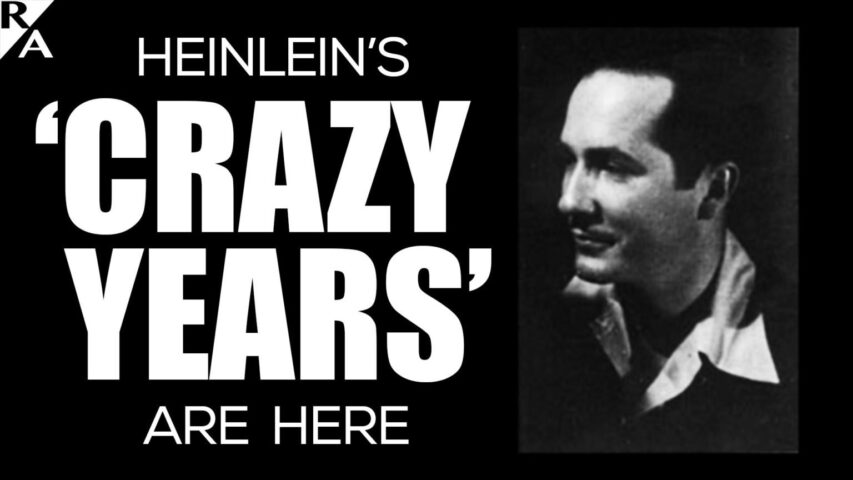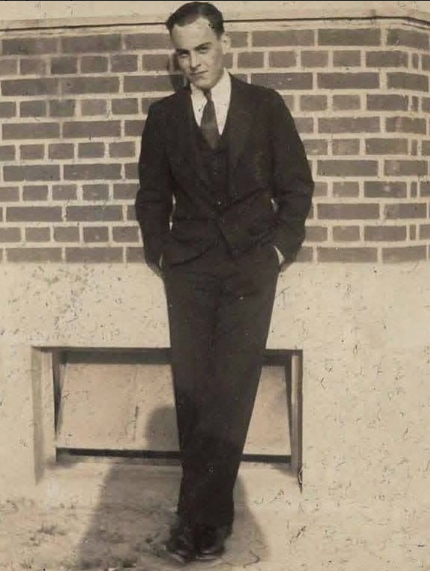World War Two
Published 1 Oct 2022Major prizes are taken by the Allies this week on two fronts — Naples in Italy and Smolensk in the USSR, but they are advancing all over the Eastern Front, across the Italian peninsula, and in the South Seas, but the enemy is leaving a trail of destruction as he pulls back.
(more…)
October 2, 2022
Smolensk and Naples Liberated! Both in ruins – WW2 – 214 – October 1, 1943
Robert Heinlein’s “Crazy Years” have nothing on real headlines in 2022
Ed West on what he calls the “triumph of the blank slate” in western culture:
As a depressive conservative who always sneered at the new atheist movement, I’ve enjoyed a certain, almost masochistic smugness about the way the sharp decline in American religious practice has led to a proliferation of wacky beliefs. I told you so, I laugh, as our boat heads for the rocks and certain doom for all of us. And every month I read something else in the media which makes me think, with the best will in the world and a sincere belief in improving our lot, that country’s ruling class is losing its grip on reality.
To take one recent example, an article in the Atlantic recently made the case that separating sport by sex doesn’t make sense, because it “reinforces the idea that boys are inherently bigger, faster, and stronger than girls in a competitive setting — a notion that’s been challenged by scientists for years”.
The author stated that “though sex differences in sports show advantages for men, researchers today still don’t know how much of this to attribute to biological difference versus the lack of support provided to women athletes to reach their highest potential”.
Quoting an academic who claim “that sex differences aren’t really clear at all” the author reported of some studies showing that “the gap they did find between girls and boys was likely due to socialization, not biology”.
On a similar theme, a few weeks back the New York Times ran a piece arguing that “maternal instinct is a myth that men created”. In the essay, published in the world’s most influential newspaper, it was stated that “The notion that the selflessness and tenderness babies require is uniquely ingrained in the biology of women, ready to go at the flip of a switch, is a relatively modern — and pernicious — one. It was constructed over decades by men selling an image of what a mother should be, diverting our attention from what she actually is and calling it science.”
Even the most prestigious science magazines increasingly make claims about sex that a decade ago would have seemed wacky. Just recently, Scientific American stated that “Before the late 18th century, Western science recognized only one sex — the male — and considered the female body an inferior version of it. The shift historians call the ‘two-sex model’ served mainly to reinforce gender and racial divisions by tying social status to the body.”
If you find any of these beliefs strange, then you might need to “educate” yourself about “the science” because this is the direction of travel now. This kind of stuff is everywhere, growing in popularity in all areas, but all ultimately having the same common inheritance — the blank slate.
Yet what is strange is that such ideas are triumphant, even as the scientific evidence against them mounts up, with the expanding understanding of genetics and the role of inheritance. The tabula rasa should by all rights be dead, indeed it should have been killed twenty years ago with the publication of one of the most important books of the century so far, Steven Pinker’s The Blank Slate.
With its subtitle “the modern denial of human nature”, Pinker’s worked looked at the various ideas that had emerged out of academia and into wider society: that rape was not about sex, that hunter-gatherer societies were peaceful, that sex differences were learned, all of these beliefs having the common theme that humans are born with infinitely malleable minds and that that life outcomes are entirely shaped by society.
Pinker felt, quite reasonably, that many of these comforting beliefs were on the way out. Of the idea that differences in intelligence were entirely environmental, he wrote that “even in the 1970s the argument was tortuous, but by the 1980s it was desperate and today it is a historical curiosity”. And yet this historical curiosity continues to flourish, and 20 years after publication, the blank slate is stronger than ever. More so than in 2002, it’s taboo to discuss the genetic components of human intelligence or the biological factors involved in differing male and female behaviour. The ground has shifted – towards the blank slate.
Pinker is an optimistic Whiggish liberal who has since produced books looking at the decline of violence and making the case that things are getting better — that’s taken a wobble this decade, but I think he’ll be proven right, even if I think the new atheist-aligned cognitive psychologist has a slight blind spot about religion. In the Blank Slate he argued that worthy progressive goals should not rest on untrue scientific assumptions about human nature. When those ideas are proven false, the political argument will crumble too — and yet this hasn’t happened. Instead the taboos just grows stronger.
“We are governed by a transnational criminal enterprise”
Elizabeth Nickson on the deliberately created web of disasters the entire western world faces thanks to our governments’ allegiance to philosophies promulgated by organizations like the WEF:
We are governed by a transnational criminal enterprise.
What are you doing about it?
One sentence caught my attention in Giorgia Meloni’s speeches this week. She said that most insulting thing for her and other Italians, was the EU’s order to erase all references to Christianity, Christmas and Christ from all government documents by Christmas (ironic) of 2022.
This is another of those blows from the One Worlders that feels like someone is stepping on your heart and pressing down. I may not be a church-going Christian, but it defines me like almost nothing else. It is my history, my literature, my culture, my ethical standards, my everything. Christianity defines the western world, it is an activist faith, it orders a congregant to spread goodness wherever he or she goes. Erasing it is a crime similar in effect as the death camps of which our leaders dream. It destroys the ground of our being.
And then I think of my father. Look at this photograph. As a teen, he was very much like the kids of today, self-involved, vain, a girl magnet like his great grandson, Bryson, who never sees a girl who doesn’t interest him. But he was one of the few fully adult men I have known. I want to say only, but I’ve met thousands of men and know few of them as well as I knew him.
It wasn’t until long after my father’s death that I discovered that he was at the tip of the spear of the British Army as they landed at D-Day, pressed forward into France and then into Germany. The Canadian Army, the fourth largest standing army in the world in 1945, had a reputation of brutalism like no other army, famous for it in WW1. This was in part because it was built – as was Canada – by some of the fiercest medieval clans in Europe. Just before James 1 murdered the British border clan heads, Elizabeth I said that with 10,000 such men, James could topple any throne in Europe. Canada attracted those clans, the climate, the terrain was the roughest in the world, and only they could conquer it. And in 1943, they formed an army like none other.
Being his child, I can grope myself into what he was feeling during those two years under remorseless fire, on the ground, buried into caves on the Rhine that last winter, responsible for hundreds of men. He woke up every day for two years, with death certain. I have his Book of Common Prayer. It is swollen with use, especially the prayers for the dead he read over the bodies of his friends. After the war he was put in charge of a Nazi camp and told to “sort those people out”. Kind of like a desert in hell, I would think.
His faith carried him through those years. He was welded to it by the time it was over, although he never proselytized, it was just part of him. Christianity acts, with good men, as spur and comfort. It informed every ethical decision he made. After the war, he came home and worked, fighting unions that destroyed the textile industry in Quebec, trying to keep his factory going in the face of actual bags of burning shit thrown at our house. He retired at 55 with a non-compete clause and spent the rest of his life in charity, working for free. He ran in succession one enterprise after another. His entire life, all of it, he used his spare time to work in the community. Three meetings a week, no matter what. He knew where every sparrow fell in the country village I grew up in, and in the city to which he retired. And if he missed one, his uncles, aunts or cousins picked them up and set them right. It was how they lived.
That used to be a requirement for adulthood. He learned it from his family who came to the New World in 1630, and who all, to a man or woman, worked for free in whatever village or county they found themselves in, making sure everyone was all right. In the towns and cities they settled, across the US and Canada from 1600 to 1945, you were only considered an adult if you rolled up your sleeves and worked for other people in the place that you lived, without being paid, and without expecting praise.
If you didn’t do that work, you were considered a baby that everyone else had to carry. You were made to feel that.
It was that above every single other thing, that made the US and Canada the magnet it is for every other race and country in the world. Self-government by adults. And by the way, for the race-hustlers, they were officers on the Underground Railroad, when it wasn’t popular to be on the side of people of color. They married into Indian bands when it was absolutely beyond the pale.
The boomer generation abandoned that task, and the devolution of the culture was swift. The left creates jobs by creating bureaucrats and the responsibilities that used to be held in common, solved in common, done for goodness alone, are now done for money and benefits by people who generally do not live in the regions they supervise. They have screwed up everything because they can’t make decisions because they have no courage. And they have no courage because they have no ethical standards. Their only standard is whether it increases their own comfort. And that of maybe two other people. To whom they are related.
The only thing they create is debt and obstacles to growth. Aside from technical/engineering standards, (which are being broken) everything they do, can be done by citizens acting in concert.
Our disengagement led to our current economic catastrophe, like nothing else. It is the reason the globalist criminals were able to take over. It is why we now sit in danger of nuclear war.
What is a Bopper Car?
Lake Superior Railroad Museum & NS Scenic Railroad
Published 5 Jun 2020Railroads came up with lots of great ideas to make things more efficient. Many of those ideas, like bottled water, and the red carpet, are part of our daily lives … as we have shown you in previous episodes.
Today, we talk about an idea that sounded good, but didn’t work out: The Bopper Car. A combination of hopper car and box car. Only a few were made, and the remaining ones were donated to the Lake Superior Railroad Museum. Today they’re used as storage for many of the shop’s parts.
(more…)
QotD: US intelligence failures in the Tet Offensive
[In The Tet Offensive: Intelligence Failure in War, James] Wirtz argues that Tet was not an intelligence failure in the sense that “the Allies” (his term) had no idea it was coming. US analysts had lots of information indicating a pending attack — indeed, sometimes too much information. Nor was it a complete failure to analyze the available information — lots of US analysts were in the ballpark about the size, direction, and even timing of the attack, and one analyst, Joseph Hovey, produced a report that predicted the whole thing with astonishing accuracy. Rather — and this is my term, not Wirtz’s — it was a failure of narrative.
By summer 1967, MACV (for convenience) had convinced itself that the North Vietnamese no longer had the resources to win the war militarily, and they knew it. This conclusion was based in large part on metrics coming in from field commanders. Specifically, MACV argued that by mid-1967, the Communists had passed what they, MACV, termed the “inflection point” — the North Vietnamese were losing more forces than they could replace, which led to a significant decrease in NVA / VC fighting capacity, plummeting morale, etc.
At no point, it seemed, did they question this assumption, or the bases of this assumption, the key to which was: Kill ratio. We all know how that goes, no need to get into the weeds, but note that everything hinges on the North Vietnamese not only losing the war, but knowing themselves to be losing.
[…]
So, too, with ever-increasing reports that the Viet Cong were going to launch major attacks on South Vietnamese cities. Since US analysts assumed the VC didn’t have the forces for that, these reports were dismissed as propaganda.
Finally, the assumption that the NVA knew themselves to be losing was seemingly confirmed with the siege of the big US firebase at Khe Sanh. It shared a similar geography with Dien Bien Phu, and when some of the same units that had participated in the original battle showed up to take on the Marines, US analysts concluded that the Communists, desperate for a psychological victory, were trying to make another Dien Bien Phu out of Khe Sanh.
At most, US analysts reasoned, Khe Sahn was another Battle of the Bulge — a last-ditch “saving throw”-type attack by an almost-beaten enemy. Much like German forces in the Ardennes, then, the North Vietnamese would attack the Americans, because they were the strongest part of the Allies, and therefore the most immediate military threat.
In fact, almost the exact opposite was true, pretty much all the way down the line. The NVA’s plan was to attack ARVN (the South Vietnamese Army) because they were the weakest, and would be even weaker during Tet, when half of them would be on furlough. But ARVN wasn’t out on the perimeter and along the DMZ. They were in the cities. The whole point of the attack on Khe Sanh (and of a whole series of skirmishes called “the border battles”) was to keep US forces out on the perimeter and away from the cities.
It worked spectacularly, too — even as Tet was unfolding, Gen. Westmoreland assumed it was a diversion, to draw American troops away from Khe Sanh. Half the country had been overrun before Westy began to think maybe Khe Sanh wasn’t the target after all; he only really believed it when the NVA broke off the siege and withdrew.
It was Narrative uber alles.
Severian, “Book Rec: Tet, Intelligence Failure”, Founding Questions, 2022-06-30.






